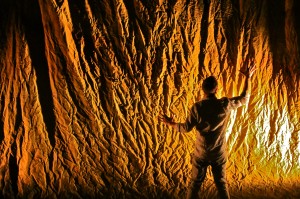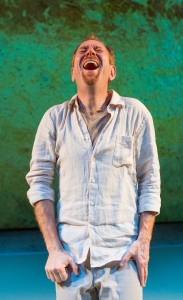How many times has someone attempted to explain the "situation" in the Middle East? And, of those times, how many have felt one-sided? No matter how hard the best of us try, the reasoning often has a bent, a leaning toward one side or another. “It’s complicated,” after all. In Wrestling Jerusalem, Aaron Davidman presents 17 voices of men, women, Israelis, Palestinians, Brits, doctors, farmers, and rabbis, among others, in a manner that can be heard and understood with refreshing deference. His affinity for the material, as well as the struggle and heartbreak of people, is breathtaking.
As the playwright, Davidman has done his homework. “You might say it all started in 1948” or “You might go back to World War I,” he says, but wherever you might think he is leading you, it’s not where he’s going. Wrestling Jerusalem is in uncharted territory. Six Day War, Intifada, United Nations Resolution 181, Invasion of Lebanon, or the settlements: he unwraps the causes and the concerns, the politicians and the terror attacks with such deftness that he draws the audience into being concerned regardless of any predilection they had when they walked in. He causes one to care, to want to know more. “If, if, if, if, if, if,” he declares. If only this hadn’t happened or if that hadn’t occurred, things would be different, right? It’s the manner in which he constructs the inquiry that is at heart of his invitation to look deeper, practically challenging the audience not to care.
Davidman’s skill reaches well beyond his writing. His talent as an actor, adept at the nuance and complexities of characterization, is thoroughly engaging. Each of the 17 is based on people he has encountered in his attempt to understand the Israeli-Palestinian conflict, whether in North America or on his travels through Israel and Palestine. Like a chameleon he embodies the subtleties of Farah, a Palestinian woman in her 30s, or Professor Horowitz, a British man in his 50s, or Rabbi Moses, an American in his 60s. Davidman sings Yiddish songs from his days at children’s camp to the cherished “Shalom Aleichem.” He dances to folk songs from the homeland as Allen Willner’s lighting creates shadows around him. It is equally as powerful to observe him on the ground pushing invisible sand, as it is to viscerally feel his fear crossing the Israeli border into Palestine; he is that passionate.
The backdrop for this extraordinary experience is a beautiful, yet simple painted tarp along the back wall designed by Nephelie Andonyadis. At times it has the feeling of windswept sand and at others a ragged mountain range, depending on the lighting of Willner who colors the backdrop and space with rich oranges and yellows, or a vibrant blue, and then in an instant throws Davidman into the harsh, bright sunlight of the Ben Gurion tarmac. Bruno Louchouarn is responsible for original music and haunting sound effects. Credit for the keen direction of Wrestling Jerusalem goes to Cuban playwright and director Michael John Garcés. He brings a rich and varied background in community-focused plays, which is particularly evident in this production.
There are many profound and wrenching moments in the 90-minute Wrestling Jerusalem. Davidman’s character, Ibrahim, a Palestinian cries, “The only Israelis my children have known drive tanks, invade neighborhoods, intimidate their parents at checkpoints. The only Israelis I have known own the water trucks that deliver my water. My water.” His interaction with Rabbi Moses, who emphatically declares, “Adonai Echad does not mean there is only one God. Adoni Echad means God is One. What’s the difference? There’s a huge difference. God is One. One, not the number. One, the truth of indivisibility.”
All of which is extremely important in a landscape where people, politicians, and religion drive the conversation as to “who does the Holy Land belong to?”
“As the muezzin’s call to prayer floats out over the Wall,” Davidman tries to make sense of it all. “Please. You can hear the cry inside the cracks. Please, God, help me. Help us. The Wailing Wall holds the tears of generations.” His inquiry into the Middle East conflict may not answer any questions or even the ones everyone has come to expect, however he wrestles the word humanity into the bright light of day. “’And it’s the work of human beings,’” say the Kabbalists, “’to find those sparks, those fragments of goodness, and put them back together. It’s how we heal the world, they say.’”
Wrestling Jerusalem runs through April 17 at the 59E59 Theaters (59th between Madison and Park Avenues) in Manhattan. Evening performances are Tuesday through Thursday at 7:15 p.m. and Friday and Saturday at 8:15 p.m. Matinees are Sunday at 3:15 p.m. There is no late seating. Tickets cost $35. To purchase tickets, go to 59e59.org or visit TicketCentral.com.









